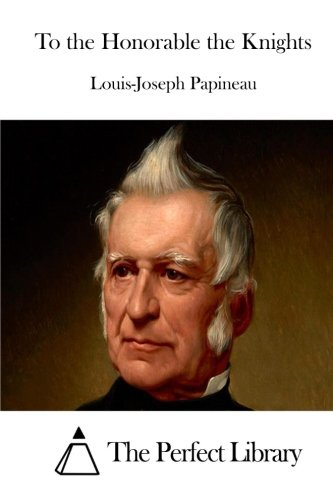Background
Louis-Joseph Papineau was born on October 7, 1786, in Montreal, Canada.



("To the Honorable the Knights" from Louis-Joseph Papineau...)
"To the Honorable the Knights" from Louis-Joseph Papineau. Politician, lawyer, and the landlord of the seigneurie de la Petite-Nation (1786-1871).
http://www.amazon.com/gp/product/1512291978/?tag=2022091-20

("Speech of the Hon. Louis-Joseph Papineau" from Louis-Jos...)
"Speech of the Hon. Louis-Joseph Papineau" from Louis-Joseph Papineau. Politician, lawyer, and the landlord of the seigneurie de la Petite-Nation (1786-1871).
http://www.amazon.com/gp/product/1512291722/?tag=2022091-20
Louis-Joseph Papineau was born on October 7, 1786, in Montreal, Canada.
He was educated at the Seminary of Quebec.
In 1809 he was elected to the Legislative Assembly of Lower Canada for the country of Kent; in 1814 he won the right to represent the Riding of Montreal West in the Assembly. He was appointed Speaker of the Assembly in 1815 and occupied that important office almost continuously until 1837. Papineau quickly became the recognized leader of the patriotes, the French-Canadian reformers, and his political strength was such that in 1820 the governor, Lord Dalhousie, sought to gain his support by offering Papineau a seat on the Executive Council. Papineau accepted and then resigned almost immediately when he found that he could not influence policy. He came increasingly to dislike the control that the British government exercised over the political life of the colony. Papineau continued to agitate during the 1836 for various reform measures, including Assembly control of crown revenues and an elective legislative council. From 1835 to 1837 he managed to block many bills in the Assembly having to do with the granting of money to the executive. In March 1837 the British government ordered the governor, Lord Gosford, to pay the expenses of government from crown funds. Papineau was incensed. On October 23, 1837, a meeting of patriotes was held at St. Charles, during the course of which armed rebellion was advocated. Warrants were issued for the arrest of Papineau and others on charges of high treason. Papineau fled into the United States and watched the progress of the rebellion from that sanctuary. In 1839 Papineau went to Paris and remained there until the general amnesty of 1847 allowed him to return. He was elected to the Legislative Assembly of the United Province of Canada in 1848 and remained a member until 1854, when he retired to private life. But other politicians, notably Louis-Hippolyte Lafontaine, had superseded him during his enforced absence, and Papineau never regained his ascendancy in the political life of the colony. He died on September 23, 1871.
("To the Honorable the Knights" from Louis-Joseph Papineau...)
(Un testament politique)
("Speech of the Hon. Louis-Joseph Papineau" from Louis-Jos...)
A convinced republican after a long exile in the United States and France, Papineau supported the Montreal Annexation Manifesto that called for Canada to join the United States of America.
Legislative Assembly of the Province of Canada
Papineau married Julie Papineau (née Julie Bruneau) in Quebec City on April 29, 1818. Together, they had 4 children that lived up to an adult age.
